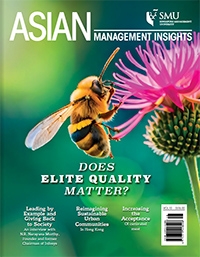Do elites contribute to a society more than they extract from it? In many countries where populism has surged in tandem with declining trust in elites in the political and other spheres, the answer is an emphatic ‘No’. The hashtag #TaxTheRich reflected growing resentment and dismay at worsening income inequality, all while activists organised the Global Protest to Fight Inequality during the same week the rich and powerful congregated at the World Economic Forum in Davos in January this year.
Alwyn Lim was part of a research collaboration that produced the Elite Quality Index, which examined the role elites in different countries play in creating value for society at large. Mediation by a strong government is a proven path to elite value creation, but a business-driven approach where corporate profits fund social goals is an alternative. At a fundamental level, he opined a commitment to economic openness and free enterprise dynamism will be crucial for elite value creation.
N.R. Narayana Murthy is a bona fide value-creating elite, founding Infosys and sparking India’s ascent to be among a select group of nations at the forefront of information technology. Murthy shares his thoughts on fostering innovation and the importance of creating trust. He also reflects on his lessons learnt as a businessman and citizen, assesses India’s current stage of development, and gazes into the future to speak about technology’s next big thing post-digital transformation.
Some of the popular anger witnessed today stems from increasingly overcrowded urban dwellings, and much can be learnt from Hong Kong’s experience in building New Towns post-World War II, which has contributed vastly to creating high-quality, high-density developments globally. As the city embarks on building its third-generation New Towns, Jeroen van Ameijde, Sifan Cheng, and Junwei Li examine integrated planning strategies that effectively address 21st-Century concerns such as environmental and social sustainability.
In this issue’s The Entrepreneur’s Corner, Jimmy Thai shares about how the Primer Group, which he formed with his brother and three friends in the Philippines, expanded to become a regional retail giant in one generation without much high-tech wizardry. From quitting a stable job to distributing global brands and establishing Primer’s own retail brands, Thai looks back at Primer moving up the value chain and how it built employee loyalty during the pandemic, not forgetting the impending handing over of the business to the next generation in the era of Artificial Intelligence (AI) and digital transformation.
AI is a powerful tool for innovation, but it is not a magic wand. Integrating AI into an organisation’s innovation process requires deep understanding of the technology involved and a clear-eyed approach to how AI can help. Adam Tatarynowicz and Utz Claassen propose a Factory Model of Innovation that drives a continuous data-driven innovation cycle which generates more, and better, solutions than the traditional Funnel Model.
AI is also widely known as a key component in ride-sharing services that matches drivers with passengers. What is less well-known is drivers’ ‘multi-homing’ behaviour, i.e., using more than one ride-hailing app to bolster their income. Wang Hai explains the costs of multi-homing and strategies to maximise earnings, as well policy implications for transport and urban planners.
The real estate and construction industry is not the most environmentally-friendly–buildings take up 12 percent of the world’s drinkable water and produce 40 percent of Earth’s carbon dioxide emissions. Much of this is a corollary of meeting economic targets which are often thought to be achieved at the expense of the environment. Tracy Xie explains how E2 innovation– achieving environmental goals without sacrificing economic ones– is possible. Above all else, committed leadership to building essential capabilities will make all the difference.
The shipping industry is relatively friendlier to the environment: marine transport carries nearly 80 percent of all transported goods but consumes roughly 20 percent of total energy expended. BHP, the world’s largest mining company, decided to improve that further by increasing the use of Liquefied Natural Gas (LNG), which produced 30 percent less emissions than conventional fuel. This issue’s Case In Point by Shantanu Bhattacharya, Flocy Joseph, and Mahima Rao-Kachroo details how the mining giant convinced multiple stakeholders such as vessel owners, regulatory authorities, and fuel suppliers to make the switch.
All these changes will be reflected in financial statements, which increasingly highlight performance not measured in dollars and cents. Financial reporting is evolving beyond the traditional bean-counting functions to transform into a stewardship role, says Yvonne Chan. A thorough understanding of accounting standards will be essential, she adds, but culture-building and change management will be key steps to take along an organisation’s sustainability journey.
We also look at sustainability from the food angle and a communication point of view. Cultivated meat, also known as lab-grown meat, is the closest thing to replicating the sensory and nutritional attributes of conventional meat without the attendant animal welfare and environmental concerns. However, considerations over its ‘unnaturalness’ and cost, among others, have translated into slow consumer acceptance. Mark Chong explains how marketing and message framing can address consumer reluctance and boost cultivated meat consumption.
The merit of cultivated meat is far down the list of priorities for developing nations, whose citizens often lack basic healthcare. Edward Booty makes the case that US$5 per resident would solve healthcare access issues for the vast majority of the underserved. Perhaps even more importantly, the developing world represents a business opportunity for healthcare and pharmaceutical companies. The key to success is accurate field data.
It all perhaps comes together: as global inequality drives an expanding wedge between the haves and the have-nots, we invite you to turn the page and read for yourself why elite quality matters, and how AI and sustainability will provide the backdrop for the coming years. Does it sound like fiction? Until 1969, going to the moon did too.
Last updated on 05 Dec 2023 .


